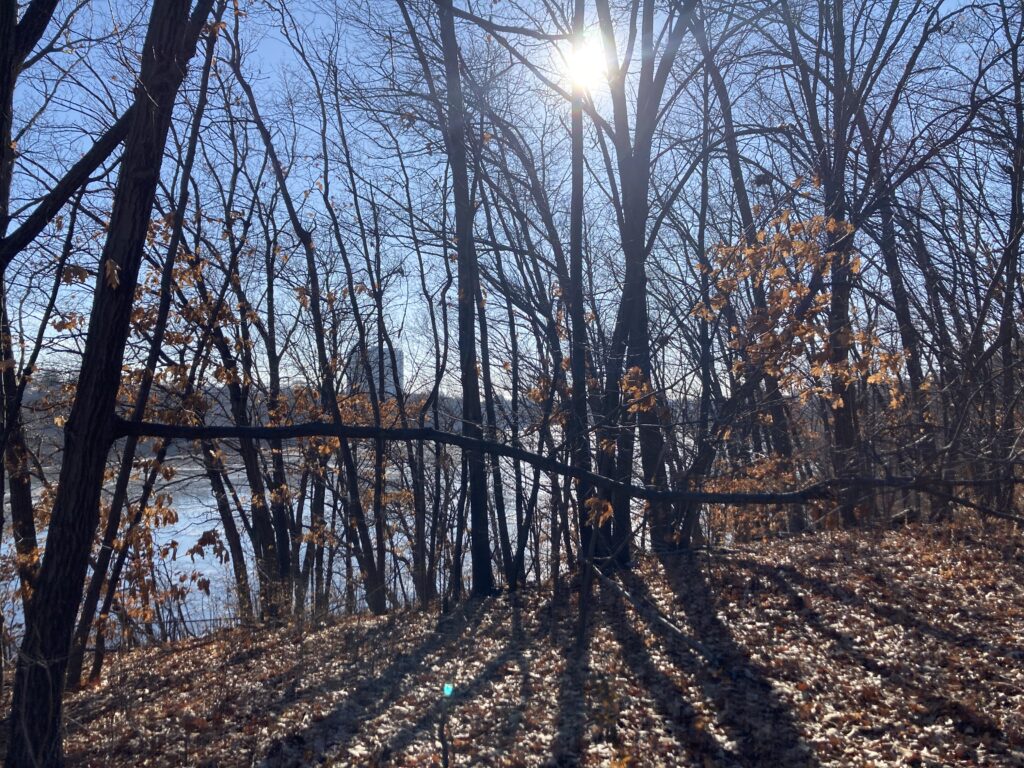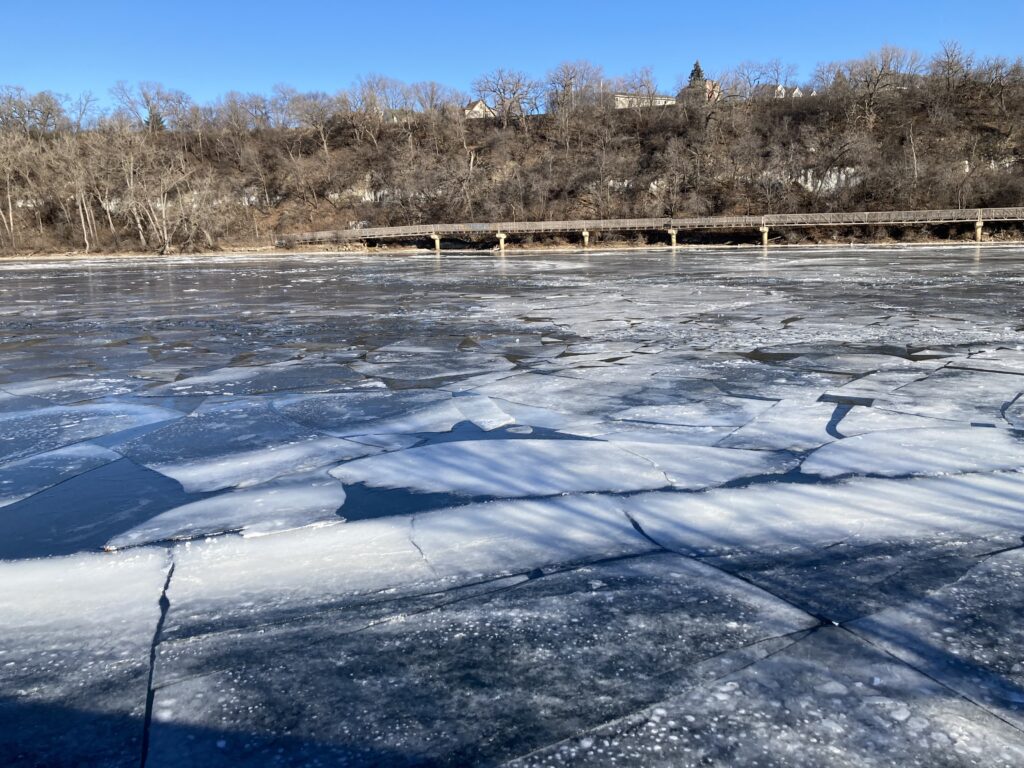4.5 miles
minnehaha falls and back
12 degrees
Another sunny, sharp shadow day. Ran south to the falls and listened to cars, birds, kids on the playground, and some guy coughing too loudly. Stopped at my favorite spot to admire the falls, then put in my “Remember to Forget” playlist. Sometimes I felt strong, and sometimes I felt tired. My legs wanted us to stop. I did a few times, including at the bench above “the edge of the world.” I took two pictures. One had a clearer view of the ice on the river, but I picked the other one, with its branches and shadows and white sun:

10 Things
- chirping birds
- my shadow, clear and strong
- shadows of trees in the park, soft and fuzzy
- a shadow of the lamp post, sharp and menacing
- someone who looked like Dave the Daily Walker from behind — a tucked shirt and not jacket, tucked into dark track pants — but wasn’t
- the creek — bright white snowy surface mixed with fast, flowing water
- the falls were gushing through the ice columns
- a man with a bad cough near the overlook
- a cold wind on my ears when I put my hood down
- the shadow of a tree sprawled across the trail that dips below the road, looking like an actual branch that might hit me as I ran by
For a moment, I thought I had completely forgot running the stretch down to, then over, the bridge that crosses above the falls, but then I remembered it: what the creek looked like, seeing some people (one of them, the man with the cough) as I crossed, but then not seeing them, and then seeing them again near the closed gate.
before the run
Last night, I started reading JJJJJerome’s Aster of Ceremonies, which I bought in october of 2023 and hadn’t read yet. Wow! Here’s a bit I’d like to take with me on my run:
What is the wound
reopening during the stutter?
How does it relate
to Morrison’s flooding? When
the Mississippi returns
to its former contours,
does the suture
we created by straightening
it open?
(Octagon of Water, Movement 2/JJJJJerome Ellis)
Last week, I was just writing about how the natural shape of the Mississippi River in the gorge is long gone, reshaped by the city and the Army Corps. After my run, I’ll read Toni Morrison’s essay to which Ellis refers.
added a few hours later: I tracked down the quotation that Ellis puts in a footnote for this poem from Toni Morrison in The Site of Memory (1995, 99):
You know, they straightened out the Mississippi River in places, to make room for houses and livable acreage. Occasionally the river floods these places. “Floods” is the word they use, but in fact it is not flooding; it is remembering. Remembering where it used to be. All water has a perfect memory and is forever trying to get back to where it was. Writers are like that: remembering where we were, what valley we ran through, what the banks were like, the light that was there and the route back to our original place. It is emotional memory – what the nerves and the skin remember as well as how it appeared. And a rush of imagination is our “flooding.” Along with personal recollection, the matrix of the work I do is the wish to extend, fill in and complement slave autobiographical narratives. But only the matrix. What comes of all that is dictated by other concerns, not least among them the novel’s own integrity. Still, like water, I remember where I was before I was “straightened out.”
The Site of Memory/ Toni Morrison
So good! I’m excited to think about these ideas some more and figure out my relationship to flooding and being straightened out and rivers before and after Minneapolis and the Army Corps of Engineers “fixed” them.
Thinking about Ellis’ stutter in relation to my vision problems. In some ways, I have a visual stutter — there’s a long pause between looking at something and actually seeing it. I need time for things to make sense. Also, images stutter, shake, fizz, are always moving, never still or sharp or clear.
remember/forget
1 — will
the differences between what we notice and try to remember and what we ignore or try to forget (16 april 2024)
2 — memory
When I heard the line, Seems like we’re livin’ in a memory, I thought about how I mostly can’t see people’s faces clearly and that I’ve either learned to tune it out and speak/look into the void, or I just fill in the smudge with the memory of their face. I’m used to it, and often forget I’m doing it until suddenly I wonder as I stare at the blob, am I looking in the right place, into their eyes, or am I staring at their chin? I don’t care, but I imagine the other person might, so I try to find their eyes again (9 may 2024).
In jan of 2024, I’m thinking about the daily, mundane bodily functions that we forget we’re doing, or don’t notice — what’s the difference between not noticing and forgetting here? I’m also thinking about this idea of memory and its relationship to the real. When is remembering “only a memory” and when can the act of remembering keep something real? Can we understand remembering as more than thinking about things from the past? What about remembering what is present, here still, real, connected to us?
3 — pay attention, be astonished, tell about it
Thinking more about the difference between noticing and remembering, I’m thinking about the different acts involved here. Yes, it is inspired by Mary Oliver’s instructions for living a life! First, we notice, then we are open to feeling something about what we noticed, then we put that noticing and our feelings into words. For my practice, I don’t try to remember to notice or to be astonished, they just happen — at least, that’s the goal. Remembering comes in when I try to put my attention and astonishment into words. So, the connection between writing and remembering.
4 — writing to remember
I’m not writing it down to remember it later, I’m writing it down to remember it now.
Field Notes slogan
Many different directions I could go with this idea of remembering and writing, but I like this idea of the act of writing about something as the remembering. I rarely look back at my (Field Notes brand) Plague Notebooks when I’m finished with them; it’s the act of writing in them that helps me remember what I noticed or was thinking about. This method is approximate and doesn’t work all of the time. In my practice, I use the act of making a list on my log of 10 things I noticed as the moment of remembering what I didn’t even realize I noticed. But, unlike my plague notebooks, I do return to my log to read past entries and remember what I wrote before — in at least 3 ways: my monthly challenge pages in which I review and summarize what I did in relation to my theme each month; my “on this day” morning reviews, in which I reread past entries from that day in different years; and my annual summary, month-by-month of my log entries.
5 — forget the body
I like my body when I’m in the woods
and I forget my body. I forget that arms,
that legs, that nose. I forget that waist,
that nerve, that skin. And I aspen. I mountain.
I river. I stone. I leaf. I path. I flower.
(Yes, That’s When/Rosemerry Wahtola Trommer)
